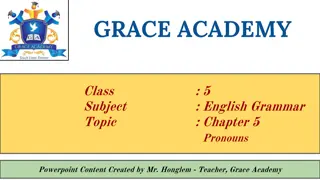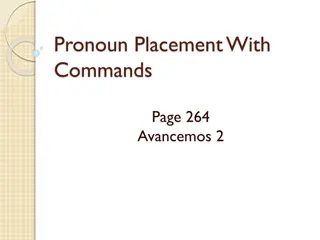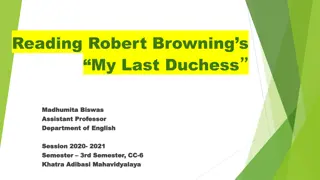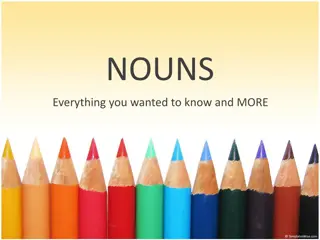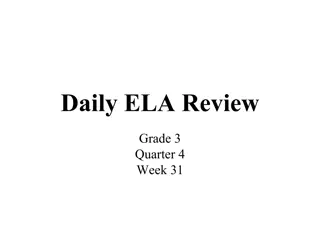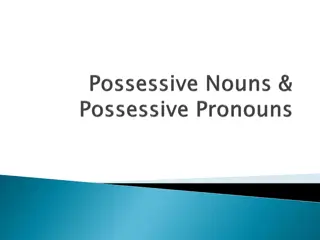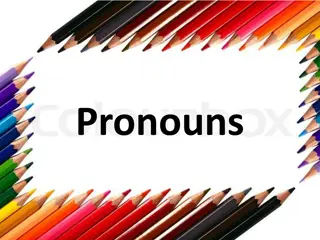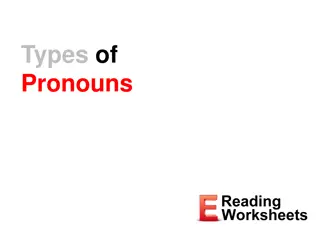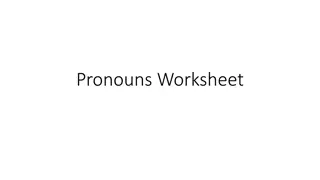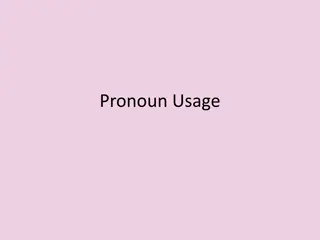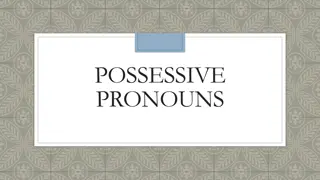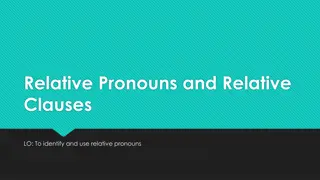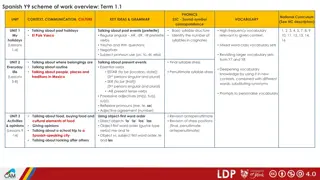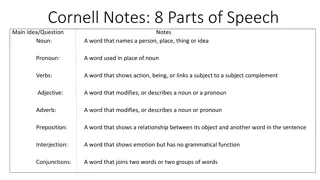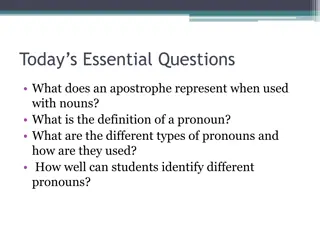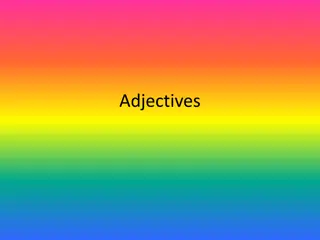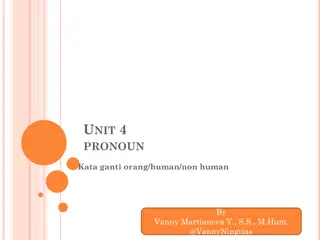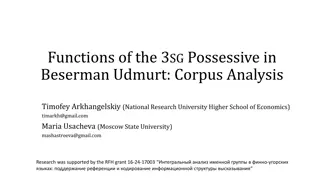Learning Adverbs, Comparatives, and Superlatives in English Grade 6 Lesson 3
Enhance your English skills in Grade 6 with Lesson 3 on adverbs of frequency, comparative and superlative forms, and possessive pronouns. Practice choosing the correct adverbs, filling in the gaps with adjectives, and mastering the use of quantifiers. Improve your language proficiency and expand you
8 views • 12 slides
Understanding Pronouns: A Comprehensive Guide for English Learners
Explore the world of pronouns with this detailed presentation created by Mr. Honglem from Grace Academy. Learn what pronouns are, discover their types including personal and possessive pronouns, and understand how to use them correctly in sentences. Engage in interactive practice exercises to enhanc
1 views • 22 slides
Pronoun Placement with Commands in English and Spanish
Understanding pronoun placement in commands is crucial in both English and Spanish. In English, pronouns are placed after the verb in both affirmative and negative commands. However, in Spanish, affirmatives attach pronouns while negatives place them in front of the verb. Examples and accent rules a
1 views • 5 slides
Practice Exercises on Determiners
Enhance your understanding of determiners with a series of exercises. Fill in the blanks with articles (a, an, the), demonstrative/possessive determiners (this, that, my, our, etc.), and numeral determiners (one, some, many, etc.). Additionally, practice error correction tasks related to determiners
0 views • 5 slides
Analysis of "My Last Duchess" by Robert Browning
The poem "My Last Duchess" by Robert Browning portrays the Duke of Ferrara showcasing a painting of his late Duchess to a visitor. Through the Duke's words, we uncover his controlling and possessive nature, highlighting his manipulation and jealousy over the Duchess's innocent demeanor. The Duke's r
0 views • 19 slides
Understanding "My Last Duchess" by Robert Browning - Analysis and Interpretations
This analysis delves into the dramatic monologue "My Last Duchess" by Robert Browning, exploring themes of power, control, and possession through the Duke's chilling narrative about his late wife. The in-depth examination reveals the Duke's possessive nature, shedding light on societal expectations
6 views • 8 slides
Understanding Pronoun Reference and Antecedent Agreement
Discover the essentials of pronouns, antecedents, and their agreement in this informative content. Learn about pronoun usage, types of errors that can occur, and how to correct them. Enhance your grammar skills to ensure clear and effective communication.
3 views • 17 slides
Promoting Equality & Diversity at Fortrose Academy: Happy, Healthy Highlanders
Fraser Thomson, an assistant Youth Worker, introduces the efforts of the Equality and Diversity Steering Group at Fortrose Academy. Lua, Dominic, and Ethan, along with other members, share the group's goals of fostering inclusivity, raising awareness, and supporting minority groups. Through initiati
0 views • 8 slides
All About Nouns: Types, Rules, and Examples
Explore the world of nouns - words that name people, places, things, or ideas. Learn about singular/plural, common/proper, concrete/abstract nouns, possessive/collective nouns, and rules for making singular nouns plural with helpful examples.
1 views • 22 slides
College Writing Workshop: Improve Your Grammar and Punctuation Skills
Enhance your writing proficiency by addressing common errors such as comma usage, pronoun agreement, and vague pronoun reference. Understand the impact of mistakes on how readers perceive your communication. Elevate your knowledge of writing rules to convey a professional image effectively.
0 views • 14 slides
Grammar Errors Correction Exercises for English Language Learners
Correcting grammatical errors is essential for students learning English. This content provides exercises where students need to identify and correct errors in given sentences. The errors include punctuation mistakes, subject-verb agreement, possessive forms, and spelling errors. By practicing these
0 views • 23 slides
Understanding Possessive Pronouns and Adjectives in Family Stories
Explore how possessive pronouns and possessive adjectives are used in family stories featuring the Yeung, Ching Yee Annie, Lee, Fung King Jackie, and Simpson families. Discover how pronouns replace repeated nouns to make storytelling more engaging and concise. Dive into narratives about family membe
0 views • 15 slides
Daily ELA Review Grade 3 - Week 31 & Week 32 Activities
Engage your third-grade students with daily ELA review tasks for Week 31 & Week 32. Practice possessive pronouns, past tense, possessive nouns, verbs, adjectives, conjunctions, and more through interactive exercises.
0 views • 48 slides
Arabic Level Lesson 15: Vocabulary Building and Translation Practice
This lesson focuses on vocabulary building and translation exercises in Arabic, reinforcing learning of words, phrases, and sentence structures. Students engage in activities like dictation, word translation, and practicing possessive pronouns in Arabic. The lesson aims to enhance language comprehen
0 views • 23 slides
Understanding Possessive Nouns and Pronouns in English Grammar
Explore the usage of possessive nouns and pronouns in English grammar through examples of singular and plural possessive forms. Learn how possessive pronouns replace possessive nouns to indicate ownership effectively in sentences. Enhance your understanding of forming possessive constructions and ap
0 views • 10 slides
Cross-Linguistic Influence on L2 Acquisition of Dutch Quantitative Pronoun "ER
This study examines the L2 acquisition of the Dutch quantitative pronoun "ER" by L1 French and L1 English adults. It explores the syntax and semantics of using "ER" with quantifiers in Dutch, French, and English, analyzing potential cross-linguistic influences on sentence acceptance. The research hi
0 views • 22 slides
Mastering Parallel Structure for Enhanced Writing Skills
Learn how to achieve balance and consistency in your sentences through parallel structure. Practice by identifying and creating parallel structures with adjectives, verbs, possessive nouns, infinitive phrases, gerunds, and more. Enhance your writing style and maintain coherence in your communication
0 views • 19 slides
Understanding Singular, Plural, and Possessive Nouns
Explore the basics of singular, plural, and possessive nouns with examples and guidelines on forming and using them correctly. Enhance your writing skills and grasp the concept of noun variations effortlessly.
0 views • 13 slides
Language Development in Children: Morphology and Syntax Acquisition
Children's language acquisition process involves developing morphology by adding inflectional morphemes to nouns and verbs, such as "-ing" and "-s" for plurals. Overgeneralization occurs as children apply rules, leading to expressions like "foots" and "mens". Additionally, irregular plurals and poss
0 views • 13 slides
Learn Pronouns with Fun Activities and Exercises!
Explore the concept of pronouns through engaging activities like games, songs, and quizzes. Discover how to recognize and use pronouns effectively by rewriting sentences with possessive pronouns. Practice your skills with online resources and have fun while learning about pronouns!
0 views • 6 slides
Understanding Different Types of Pronouns
Learn about the seven types of pronouns - Personal, Possessive, Reflexive, Relative, Demonstrative, Indefinite, Interrogative. Personal pronouns replace nouns, possessive pronouns replace possessive nouns, reflexive pronouns refer back to the subject, relative pronouns introduce relative clauses, an
0 views • 16 slides
Language Arts Class Activities - Friday, September 11th
Engage in silent sustained reading and noun practice in today's Language Arts class. Explore essential questions about pronouns and antecedents, practice identifying common, proper, singular, plural, and possessive nouns, and delve into the concept of pronouns. Enhance your understanding through ind
0 views • 32 slides
Understanding Pronouns: Complete Worksheet for Practice
This detailed worksheet provides comprehensive information on subject pronouns, object pronouns, possessive adjectives, possessive pronouns, and reflexive pronouns. It includes examples and exercises to help you understand and practice using pronouns correctly in sentences.
0 views • 15 slides
Mastering Pronouns: A Comprehensive Guide
Understand the nuances of pronoun usage with this detailed guide, covering pronoun cases, usage in questions and clauses, compound structures, elliptical constructions, pronoun-antecedent agreement, and more. Enhance your writing skills by mastering pronoun rules and applications.
0 views • 10 slides
Understanding Pronoun Case: Nominative and Objective Pronouns
We have covered all pronouns in the slide show but still need to discuss pronoun case. Personal pronouns have nominative and objective cases. Nominative pronouns like "I" are used as subjects, while objective pronouns like "me" are used as objects. Learn how to use them correctly in sentences with e
0 views • 11 slides
Understanding Possessive Pronouns and Their Usage
Possessive pronouns indicate ownership and possession, such as mine, yours, hers, and theirs. Learn more about possessive pronouns with examples and practice exercises to enhance your understanding. Discover how to identify possessive pronouns in sentences and improve your grammar skills.
0 views • 5 slides
Understanding Relative Pronouns and Determiners in Grammar
Learn about the difference between pronouns and determiners, specifically possessive pronouns and determiners, and practice identifying them in sentences. Discover the concept of relative pronouns and how they are used in English grammar.
0 views • 18 slides
Understanding Possessive Pronouns and Contractions
Learn about possessive pronouns like its, her, his, our, and contractions such as it's, they're, who's, and the importance of correctly using them in writing to avoid errors. Practice examples to reinforce understanding.
0 views • 7 slides
Morphology and Optionality in Heritage Finnish Px Clauses
Explore the analysis of possessive suffixes (Px) in Finnish temporal adverbial clauses with a focus on optionality among Heritage Finnish speakers in different regions. Discover insights into refunctionalisation processes and the influence of language contact on change within loci. Definitions and c
0 views • 26 slides
Effective Use of "You" in Writing: Informal vs. Formal Guidelines
Understanding the usage of the second-person pronoun "you" in writing is essential for clear communication. In informal settings, "you" is used broadly to address readers directly or as an indefinite pronoun. However, in formal writing, it's crucial to avoid potential reader bias by using alternativ
0 views • 4 slides
Spanish Year 9 Scheme of Work Overview: Term 1 Phonics and Communication Units
Explore the Term 1 scheme of work for Spanish Year 9, focusing on phonics, communication, and culture. The overview includes topics such as talking about past holidays, everyday life, activities, opinions, sports, healthy living, weekends, and school traditions. Students will learn grammar concepts
0 views • 7 slides
Understanding Greek Noun Inflection and Cases
Explore the intricacies of Greek noun inflection, including cases like nominative, subjective, genitive, possessive, dative, and accusative. Learn about lexical forms, gender, number, and how to identify cases in Greek nouns. Dive into examples from John 3:16 and Mark 2:2 to see these concepts in ac
0 views • 36 slides
Understanding Plural and Possessive Forms in English
Learn the distinction between plural (-s) and possessive (-'s) forms in English nouns through examples and explanations. Discover how to form plurals, show possession, and distinguish between plural and possessive usage in sentences.
0 views • 8 slides
Understanding the 8 Parts of Speech in Grammar
Explore the essential components of language with Cornell Notes on the 8 parts of speech in grammar. Discover the roles of nouns, pronouns, verbs, adjectives, adverbs, prepositions, interjections, and conjunctions. Expand your knowledge on grammar levels, common and proper nouns, possessive pronouns
0 views • 6 slides
Mastering Pronoun Case: Essential Tips and Tricks
Learn about the four cases of pronouns in English - subjective, objective, reflexive, and possessive. Discover six essential tips and tricks to handle pronoun usage effectively, from using "who" and "whom" correctly to understanding when to remove or substitute information. Improve your grammar skil
0 views • 10 slides
Understanding Apostrophes and Pronouns in Grammar
Apostrophes are used to show ownership with nouns, while pronouns replace nouns in sentences. Learn the rules for apostrophe usage and different forms of pronouns including subject, object, and possessive pronouns. Practice identifying and using pronouns effectively in various sentence structures.
0 views • 15 slides
Understanding Pronouns: Types and Usage
Pronouns are vital elements in language that replace nouns to avoid repetition and make sentences concise. They include personal, possessive, reflexive, intensive, indefinite, demonstrative, relative, interrogative, and reciprocal pronouns. Personal pronouns serve as subjects (e.g., I, he, she) or o
0 views • 18 slides
Understanding Adjectives in English Grammar
An adjective is a word that describes, identifies, modifies, or quantifies a noun or pronoun. Learn about descriptive, demonstrative, possessive, and quantifying adjectives along with examples. Understand the placement of adjectives in sentences and differentiate between proper and common adjectives
0 views • 23 slides
Pronouns and Possessives in English Grammar
Explore the various types of pronouns and possessives in English grammar, including personal pronouns, possessive adjectives, possessive pronouns, reflexive pronouns, and relative pronouns. Learn how to use them correctly in sentences and understand their roles in different contexts.
0 views • 20 slides
Analysis of 3SG Possessive Functions in Beserman Udmurt Corpus
Beserman Udmurt's 3SG possessive holds significance beyond typical possessive relations, often serving non-possessive functions like marking contrastive focus. This study delves into the diverse functions of the 3SG possessive in Udmurt through corpus analysis, exploring its evolution into a definit
0 views • 35 slides

